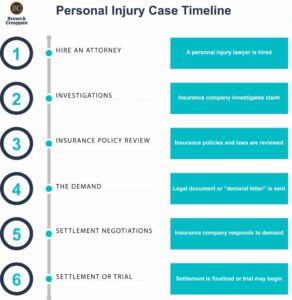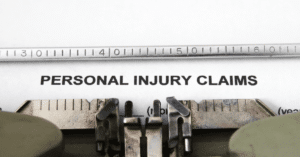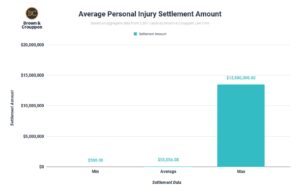Filing a personal injury lawsuit isn’t anyone’s idea of a good time, especially when dealing with the aftermath of an accident. You’ll need to determine whether you have a valid claim based on negligence and the severity of your injuries, gather evidence, calculate your damages, and decide whether to accept a settlement or go to court.
While every case is unique, this guide will walk you through the general steps. If you’re unsure about your next move, the expert attorneys at Brown & Crouppen can help you understand your legal options. Contact us for a free consultation.
Missouri's Insurance Claim Process
In many personal injury cases, you’ll have to notify the responsible party’s insurance company and inform them of your injury. This may include:
- A driver’s auto insurance company (in a car or truck accident)
- A business’s liability insurer (if you slipped and fell on their property)
- A property owner’s homeowner’s insurance (for dog bites or unsafe conditions)
- A manufacturer’s insurer (if a defective product injured you)
You’ll need to provide a written notice that explains the accident, describes your injuries, and outlines what kind of compensation you’re asking for. Most insurers require documentation such as medical records, photos of the scene, witness statements, accident reports, and repair estimates.
If the accident involves a vehicle, you’ll also need to notify your own insurance company. Even if you weren’t at fault, this step can help preserve your rights under your policy, including access to medical payments coverage or uninsured motorist protection.
Negotiating With an Insurer
Once your claim is filed, an insurance adjuster will investigate the circumstances and assign a settlement value. Because insurance companies are profit-driven, they often start with lowball offers or even deny the claim altogether. You are not obligated to accept the first offer.
Working with one of our experienced personal injury attorneys can significantly improve your chances of receiving a fair settlement. Our skilled lawyers will gather and effectively present evidence on your behalf, handle all communication with the insurer, and push back against tactics designed to minimize your payout.
If negotiations stall or the insurer refuses to negotiate in good faith, your next step may be to file a lawsuit to pursue the compensation you deserve.
What Qualifies as a Personal Injury Claim?
A personal injury lawsuit is one legal avenue to seek compensation after you’ve been hurt due to someone else’s negligence.
These court cases typically arise from incidents like car crashes, truck accidents, slips and falls, dog bites, dangerous products, or medical malpractice. You may have a valid lawsuit if you suffered an injury that caused you to need medical care, miss work, or suffer ongoing pain.
Personal injury lawsuits are based on the concept of negligence. To prove negligence, you’ll need to show:
- The person or business owed you a duty of care.
- They breached that duty.
- Their actions caused your injuries.
- You suffered damages such as medical bills, lost wages, or pain and suffering.
Furthermore, Missouri laws include comparative fault rules, which reduce your compensation based on the percentage of fault assigned to you. For example, if you were 20% at fault, you can still recover 80% of your damages. If your case is worth $100,000, it’s still possible for you to receive up to $80,000 in compensation for your injuries.
Our skilled attorneys will collect evidence, work with experts, and build a strong personal injury case on your behalf.
How To Know if Your Personal Injury Claim Is Valid
Not every injury leads to a valid insurance claim. To determine whether your claim is legally valid, you’ll need to look at a few key factors:
- Was someone else at fault for what happened?
- Did their actions (or failure to act) cause your injuries?
- Have you suffered actual damages, such as medical bills, lost income, or pain and suffering?
Even when these elements are present, insurance companies may try to deny or reduce your claim. Some common reasons include blaming you for the accident, arguing that your injuries aren’t as serious as you say, or claiming you had a pre-existing condition.
The best way to know if your personal injury claim is valid is to talk with a knowledgeable personal injury lawyer. Our trusted attorneys can evaluate the facts of your case, explain your rights, and assess your chances of success.
When To Consider Filing a Personal Injury Lawsuit
Sometimes, filing a lawsuit is necessary, especially when the insurance company isn’t playing fair. If the insurer denies their policyholder was at fault, offers far less than your claim is worth given the severity of your injury and disability, or delays payment for too long, it might be time to take legal action. Filing a lawsuit can push the insurer to offer a better settlement or allow a judge or jury to decide the amount of compensation you may be entitled to.
Your lawyer will likely send a demand letter to start the personal injury lawsuit process. This formal step outlines your case and the compensation you seek. Many claims are settled at this stage, but if no agreement is reached in negotiations, the next step is to file the lawsuit with the court.
Why Work With a Lawyer When Filing an Injury Claim
Hiring a personal injury lawyer can change the game for your benefit when you’re up against powerful insurers. The legal process is complicated and time-consuming, especially when recovering from an injury. That is why having a lawyer gather evidence on your behalf, deal with uncooperative insurance adjusters, and calculate the full value of your losses is a game changer.
Our experienced attorneys know how to negotiate for a better settlement and, if necessary, how to take your case to court and win. We work on a contingency fee basis, meaning you don’t pay anything unless we win your case.
We can help you avoid mistakes that could delay or harm your case, such as missing filing deadlines and overlooking court procedures and documentation standards. Working with one of our accomplished attorneys can significantly improve your chances of winning your personal injury lawsuit.
Insurance companies take claims more seriously when they know an attorney from our award-winning law firm is involved.
Can I File a Claim Without a Lawyer?
Yes—you can file a personal injury claim without a lawyer. But that doesn’t always mean it’s a good idea. Having a lawyer on your side significantly increases your chances of a positive outcome. Taking on the legal process alone leaves you with just a four percent chance of winning your case.
At the very least, you should speak with an attorney first. We offer free consultations with no obligations. That way, you can understand your options before deciding how to move forward.
Missouri's Statute of Limitations for Personal Injury Claims
In Missouri, strict deadlines apply for filing personal injury lawsuits. If you miss the window, your case may be dismissed even if it’s valid. Here are the key time limits:
- Personal Injury: You have five years to file from the date of injury. Exceptions apply that pause the statute if the injured person is a minor or mentally incapacitated. If the claim involves a government entity, you must give notice within 90 days, or your claim could be barred.
- Medical Malpractice: You have two years to file a lawsuit from the date of the alleged negligence. If the injury wasn’t immediately discoverable, you have two years from the date of discovery. No malpractice claim can be filed more than 10 years after the negligent act. For minors, the clock starts at age 18, and they typically have until age 20 to file.
- Wrongful Death: You have three years to file from the date of death. The right to file goes first to the deceased’s spouse, children, or parents. If none are available, a sibling or a court-appointed plaintiff ad litem may file.
While there is no telling how long a personal injury lawsuit takes to reach a settlement or verdict, our vigilant attorneys will stay on top of things every step of the way, including keeping track of key dates, preserving evidence, and ensuring your case is filed properly and on time.
Reach Out to Our Experienced Personal Injury Attorneys for Help Filing Your Claim
If you’ve been injured and are wondering how to file a personal injury lawsuit, don’t go it alone. These cases require a deep understanding of the law, strong negotiation skills, and careful attention to detail. Having the right legal team on your side can make all the difference.
At Brown & Crouppen Law Firm, our knowledgeable attorneys have decades of experience assisting individuals injured in St. Louis and Kansas City. Our firm has consistently championed the cause of justice for injured individuals.
We know how to build strong cases, deal with insurance companies, and fight for the full and fair compensation our clients deserve. We’re proud to be part of the community, and we’re committed to providing top-tier legal representation. If you’re ready to take the next step, contact us online or call 800-536-4357 for a free consultation.








